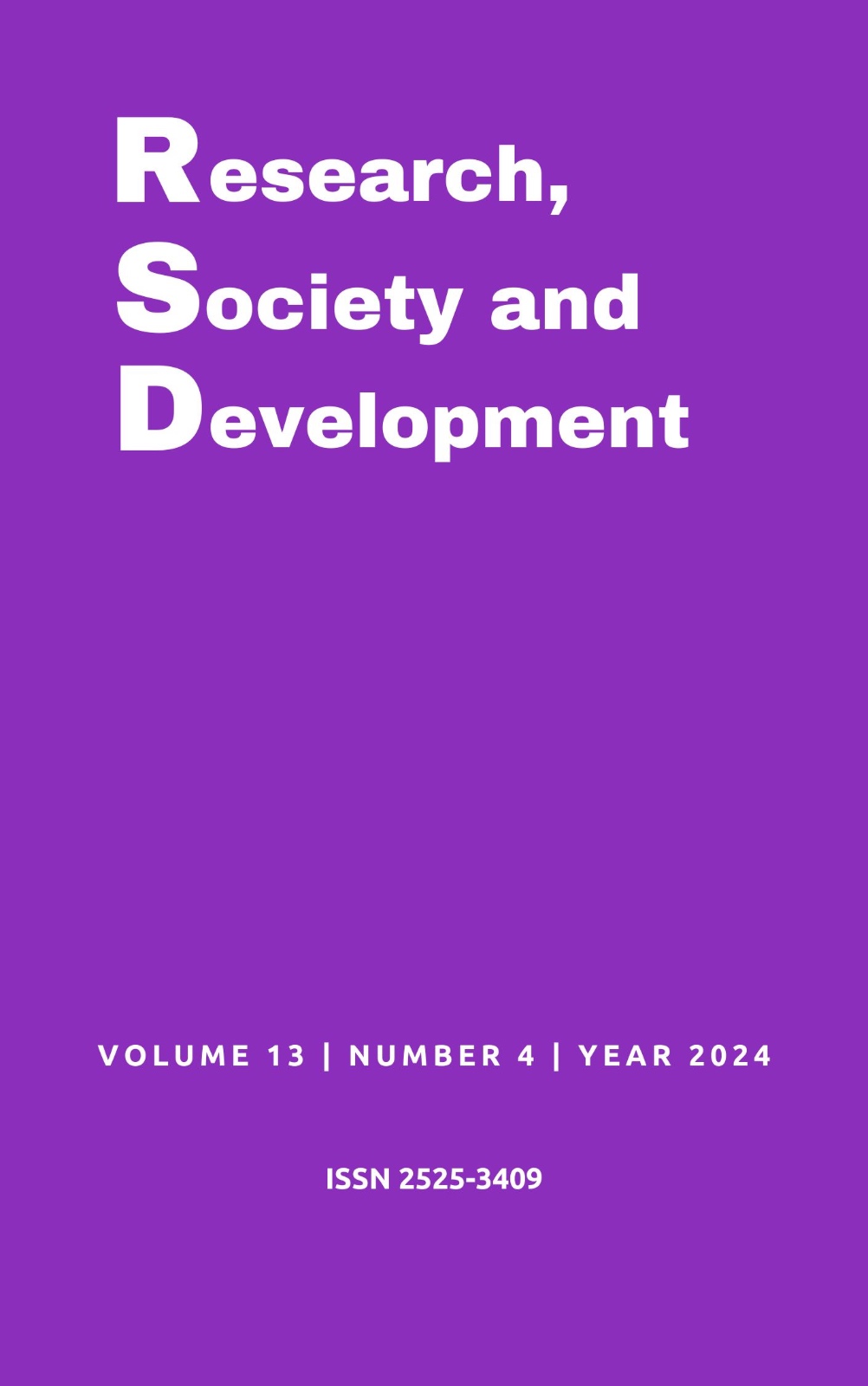CAPES Visiting Professor Program Abroad: Profile and international integration of scholarship researchers from the period 2009-2014
DOI:
https://doi.org/10.33448/rsd-v13i4.45442Keywords:
Visiting professor program abroad, Scientific production, International collaboration.Abstract
The Visiting Professor Program Abroad is maintained by Coordination for the Improvement of Higher Education Personnel. (CAPES) and offers internship scholarships in various countries to researchers from Brazilian educational and research institutions. This study aims to assess how much the international insertion of scientific production of scholarship researchers was enhanced after the internship. To achieve this, it analyzes the profile of researchers, scientific production, and international collaboration (co-authorship with foreign researchers) through bibliometric and scientometric indicators. Data collection of scholarship researchers was conducted through CAPES and CNPq systems and refers to scholars awarded for 12 months by the Program, from 2009 to 2014, who undertook internships in countries that hosted more than 30 scholars (totaling 719 researchers and 8 countries). The scientific production of scholarship researchers was obtained by Lattes Curriculum and Web of Science. Scholarship researchers were mostly above 36 years old, with the majority undertaking internships in the United States, and the Humanities being the most benefited major area. Scholarship researchers from major areas such as Agricultural Sciences, Biological Sciences, Health Sciences, Exact and Earth Sciences, and Engineering already had a robust international insertion in the Pre-Internship period abroad, which was significantly increased after the internship abroad.
References
Arum, S. & Van Water, J. (1992). The need for a definition of international education in U.S. universities. In K. C. (Org). Bridges to the futures: Strategies for internationalizing higher education. Carbondale, IL: Association of International Education Administrators.
Brasil. (2011). Decreto nº 7.642, de 13 de dezembro de 2011. Institui o Programa Ciência sem Fronteiras. https://www.planalto.gov.br/ccivil_03/_ato2011-2014/2011/decreto/d7642.htm.
Brasil. (1951). Decreto nº 29.741, de 11 de julho de 1951. Institui uma Comissão para promover a Campanha Nacional de Aperfeiçoamento de pessoal de nível superior. Coleção de Leis do Brasil - 1951, Página 8 Vol. 6.
Castells, M. (1999). A sociedade em rede. Paz e Terra.
Coordenação de Aperfeiçoamento de Pessoal de Nível Superior-Capes. (2010). Plano Nacional de Pós-graduação: PNPG 2011-2020. CAPES. https://www.gov.br/capes/pt-br/acesso-a-informacao/institucional/plano-nacional-de-pos-graduacao-pnpg/plano-nacional-de-pos-graduacao-pnpg-2011-2020
Coordenação de Aperfeiçoamento de Pessoal de Nível Superior-Capes. (2017). A Internacionalização na Universidade Brasileira: Resultados do Questionário Aplicado pela CAPES https://www.gov.br/capes/pt-br/centrais-de-conteudo/a-internacionalizacao-nas-ies-brasileiras-pdf
Cury, C. R. J. (2005). Quadragésimo Ano do Parecer CFE n. 977/65. Revista Brasileira de Educação, 30(9), 7-20.
Glänzel, W. (2003). Bibliometrics as a research field: a course on theory and application of bibliometric indicators. Research Gate. https://www.researchgate.net/publication/242406991_Bibliometrics_as_a_research_field_A_course_on_theory_and_application_of_bibliometric_indicators.
Knight, J., De Wit, H. (1999). Quality and internationalization in higher education. Organization for Economic Cooperation & Development (OECD).
Latour, B., Woolgar, S. (1997). A vida de laboratório: a produção dos fatos científicos. Relume Dumará.
Lima, M., Contel, F. Períodos e Motivações da Internacionalização da Educação Superior Brasileira. 5ème colloque de l’IFBAE. Grenoble, 18 et 19 mai., 2009
Leydesdorff, L., Wagner, C. (2008). International collaboration in science and the formation of a core group. Elsevier. https://doi.org/10.1016/j.joi.2008.07.003
McMannus, C., Oliveira, C., Neves, A. A. B. & Castro, H. O. (2021). Postgraduate Internationalization in Brazil. International Journal of Scientific Research and Management (IJSRM), 9(07), 1791-1805. 10.18535/ijsrm/v9i07.el02
Mena-Chalco, J., Cesar Junior, R. M. (2009). ScriptLattes: an open-source knowledge extraction system from the Lattes platform. Journal of the Brazilian Computer Society, 15 (4), 31-39.
Price, D. J. S. (1963). Little Science, Big Science. Columbia University Press.
Otlet, P. (1934). Tratado de documentação: o livro sobre o livro teoria e prática. Briquet de Lemos. Título original: Traité de documentation: le livre sur le livre: théorie et pratique, 1934. Presses Universitaires de Lorraine.
Qi, M. et al. (2017). Standing on the shoulders of giants: the effect of outstanding scientists on young collaborators carriers. Scientometrics, 111, 1839.
Tague-Sutcliffe, J. (1992). An introduction to informetric. Information Processing and Management, 28(1), 1-3.
Velho, L. (2001). Formação de doutores no país e no exterior: estratégias alternativas ou complementares? Dados, 44(3), 607-631.
Vieira, A. C. & Souza, D. O. G. de. (2022). Reflections on evaluation of scientific production – a special look at Brazil. Research, Society and Development, 11(15), e299111535924. https://doi.org/10.33448/rsd-v11i15.35924.
Vogel, M. J. M. (2017). Uso de indicadores bibliométricos na avaliação da capes: o qualis periódicos. Encontro Nacional de Pesquisa e Pós-graduação em Ciência da Informação, Marília, SP, Brasil, 18. http://hdl.handle.net/20.500.11959/brapci/105459.
Web Science Group. (2016). Research in Brazil: fund-ing excellence. Clarivate Analytics https://jornal.usp.br/wp-content/uploads/2019/09/ClarivateReport_2013-2018.pdf.
Downloads
Published
Issue
Section
License
Copyright (c) 2024 Márcio Moura de Castro; Ediane Maria Gheno; Diogo Onofre Gomes de Souza

This work is licensed under a Creative Commons Attribution 4.0 International License.
Authors who publish with this journal agree to the following terms:
1) Authors retain copyright and grant the journal right of first publication with the work simultaneously licensed under a Creative Commons Attribution License that allows others to share the work with an acknowledgement of the work's authorship and initial publication in this journal.
2) Authors are able to enter into separate, additional contractual arrangements for the non-exclusive distribution of the journal's published version of the work (e.g., post it to an institutional repository or publish it in a book), with an acknowledgement of its initial publication in this journal.
3) Authors are permitted and encouraged to post their work online (e.g., in institutional repositories or on their website) prior to and during the submission process, as it can lead to productive exchanges, as well as earlier and greater citation of published work.


